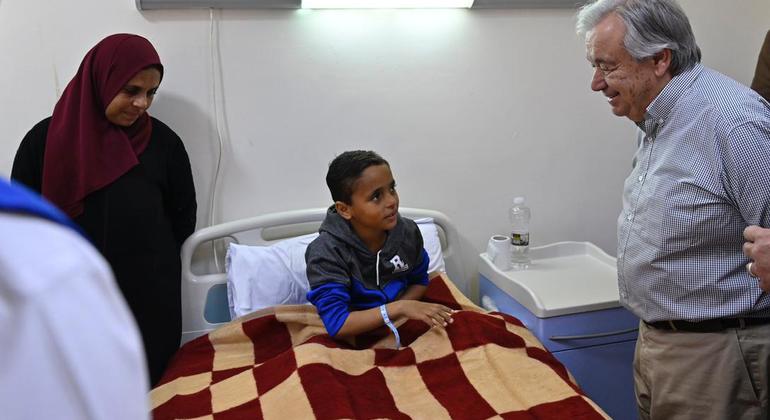“The need is urgent,” Mr. Guterres said in Amman, alongside Jordan’s Foreign Minister Ayman Safady, as he pledged to keep pushing “for the removal of all obstacles to life-saving aid, for more access and more entry points” into Gaza.
The UN chief’s appeal came amid increasingly dire scenes reported by UN humanitarians and other aid partners, particularly in northern governorates, where the World Health Organization (WHO) reported that 27 children have now died from complications linked to severe malnutrition.
“We must face facts. There will be no sustainable humanitarian solution with an ongoing war as bloody as this,” the UN chief stressed.
“Let me repeat: nothing justifies the abhorrent October 7 attacks and hostage-taking by Hamas and nothing justifies the collective punishment of the Palestinian people.”
UNRWA shut out
The Secretary-General’s appeal for a lasting peace and a humanitarian ceasefire to enable the effective delivery of food, fuel and medicines came as the UN agency for Palestinian refugees, UNRWA, confirmed that it had been barred by the Israeli authorities from transporting assistance to northern Gaza.
At the same time, the UN agency – which is the largest international aid provider in the enclave – reported that basic commodities in northern governorates were now “25 times more expensive than they were before the war”, with a 25-kg sack of flour costing more than $400.
Despite the warnings that famine is imminent in Gaza, “there has been no significant change in the volume of supplies entering Gaza or improved access to the north,” UNRWA insisted.
It noted that during the first 23 days of March, just 157 aid trucks per day crossed into Gaza, on average. This is “well below the operational capacity of both border crossings and the target of 500 per day”, according to UNRWA.
Delays continue to happen at Kerem Shalom crossing from Israel and at Rafah from Egypt, the UN agency noted, adding that the killing of several Palestinian policemen in Israeli airstrikes near the crossings in early February had “severely impacted” the delivery of aid.
Help and hope for millions
Earlier, the UN Secretary-General stressed once again UNRWA’s positive impact in millions of people’s lives, while on the latest leg of his annual solidarity visit marking the Muslim holy month of Ramadan.
“We must strive to keep the one-of-a-kind services that UNRWA provides flowing because that keeps hope flowing,” he said after meeting residents at Wihdat Palestine refugee camp, home to some of Jordan’s 2.4 million Palestine refugees – the largest number in the region.
Insisting that that the UN agency remained “a lifeline of hope and dignity” for many, Mr. Guterres underscored the “real difference” that its schools and health centres make to the lives of Palestinian refugees of all ages.
Peacebuilding role
In addition to providing education to over 500,000 girls and boys, some two million people receive health care and work opportunities, the UN chief explained, while half a million of the poorest Palestinians also benefit from its assistance. All of these factors contribute to UNWRA’s key role in “advancing social cohesion, promoting stability and building peace”, he said.
“Imagine if all of this was taken away. It would be cruel and incomprehensible, especially as we honour the 171 women and men of UNRWA who have been killed in Gaza – the largest number of deaths of UN staff in our history.”
Across Gaza, meanwhile, conflict continued unabated at the weekend, with Israeli bombardments and airstrikes reported in southern Gaza, including in Rafah, where UNRWA estimates that 1.2 million people now live, “the vast majority in formal and informal shelters”.
Veterans’ horror
Describing his visit to the Rafah border crossing at the weekend, the UN Secretary-General said that the veteran humanitarians he had met “have never seen anything as horrible” as what has unfolded in Gaza.
“The scale and speed of the death and destruction are on an entirely different level, and now, starvation is bearing down on Palestinians in Gaza,” he said.
Insisting that there was “a growing consciousness around the world that all of this must stop”, the UN chief said a two-State solution was the only way to ensure a lasting end to the Israeli-Palestinian conflict.
“Israelis must see their legitimate needs for security materialized, and Palestinians must see their legitimate aspirations for a fully independent, viable and sovereign State realized, in line with United Nations resolutions, international law and previous agreements,” Mr. Guterres said.
Tedros concern amid new hospital raids
WHO Director-General Tedros Adhanom Ghebreyesus also expressed deep concern on Monday amid reports that Israeli forces had “besieged and attacked” Al-Amal Hospital in the southern city of Khan Younis on Sunday.
Tedros noted that a Palestinian Red Crescent worker and another individual sheltering at the hospital had been killed.
“Another reported attack on Al-Amal Hospital in Gaza, another situation where patients and health workers are in great jeopardy,” Tedros said on X, formerly Twitter. “We appeal for their immediate protection and repeat our call for a ceasefire.”
The UN health agency previously said that a WHO team “was not given clearance” to reach the hospital to assess needs nor ensure patient referrals, although it was able to give water and first aid to nine health workers “who walked from Al-Amal to south Gaza”.
Media reports on Sunday indicated that Israeli military vehicles reached Al-Amal and Nasser hospitals in Khan Younis. Such raids have been previously justified by the Israel Defense Forces as necessary to search for Hamas fighters.




















Discussion about this post